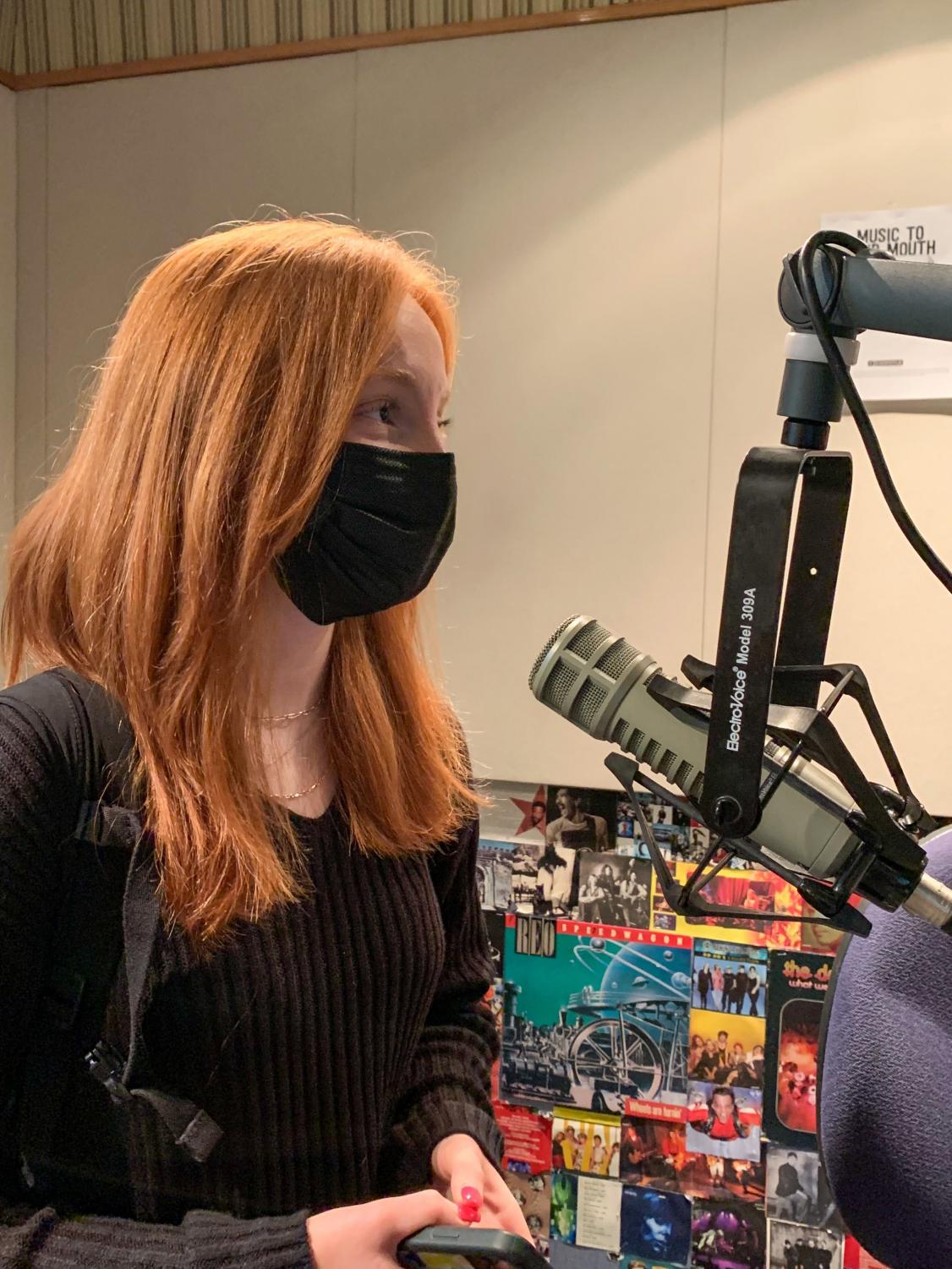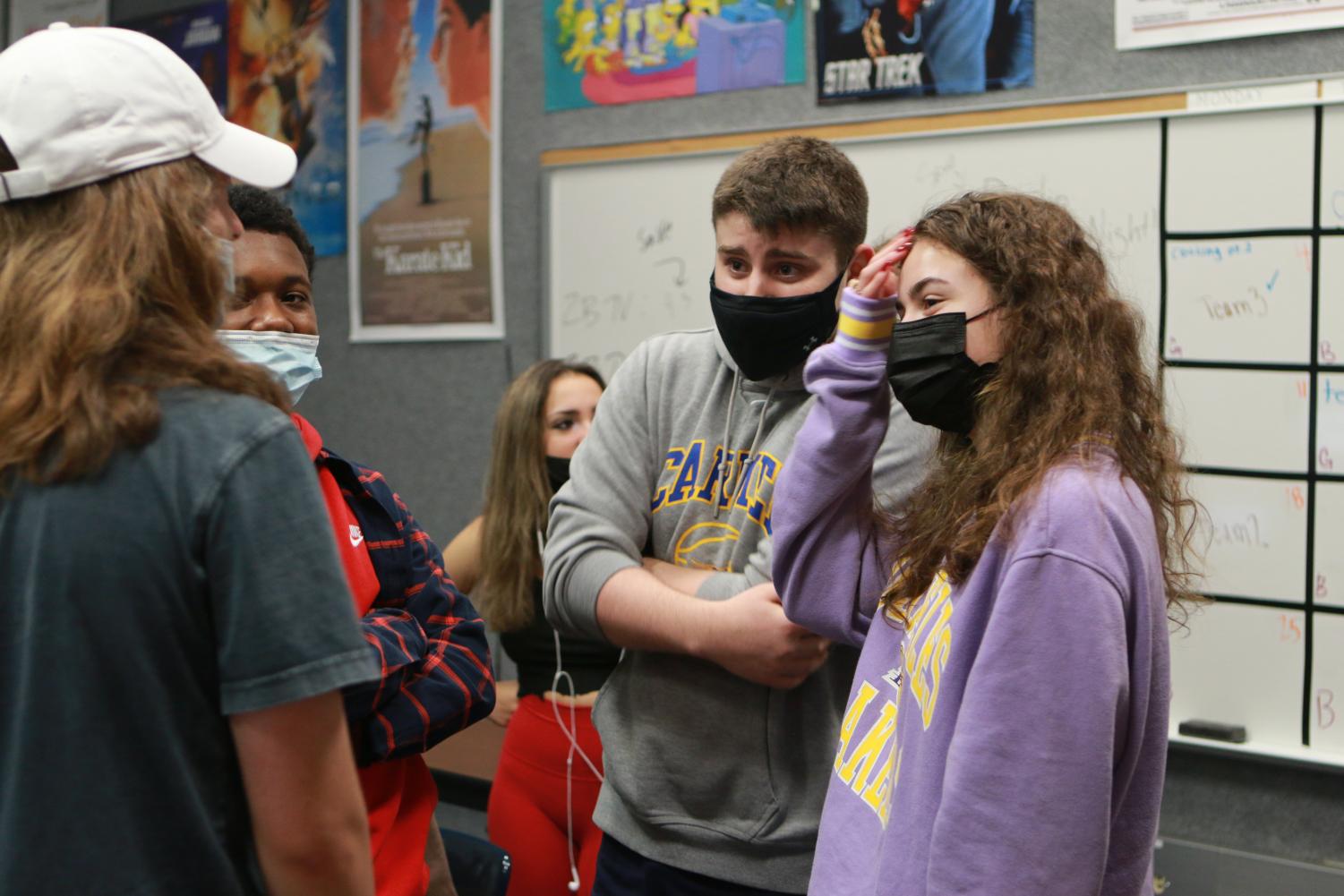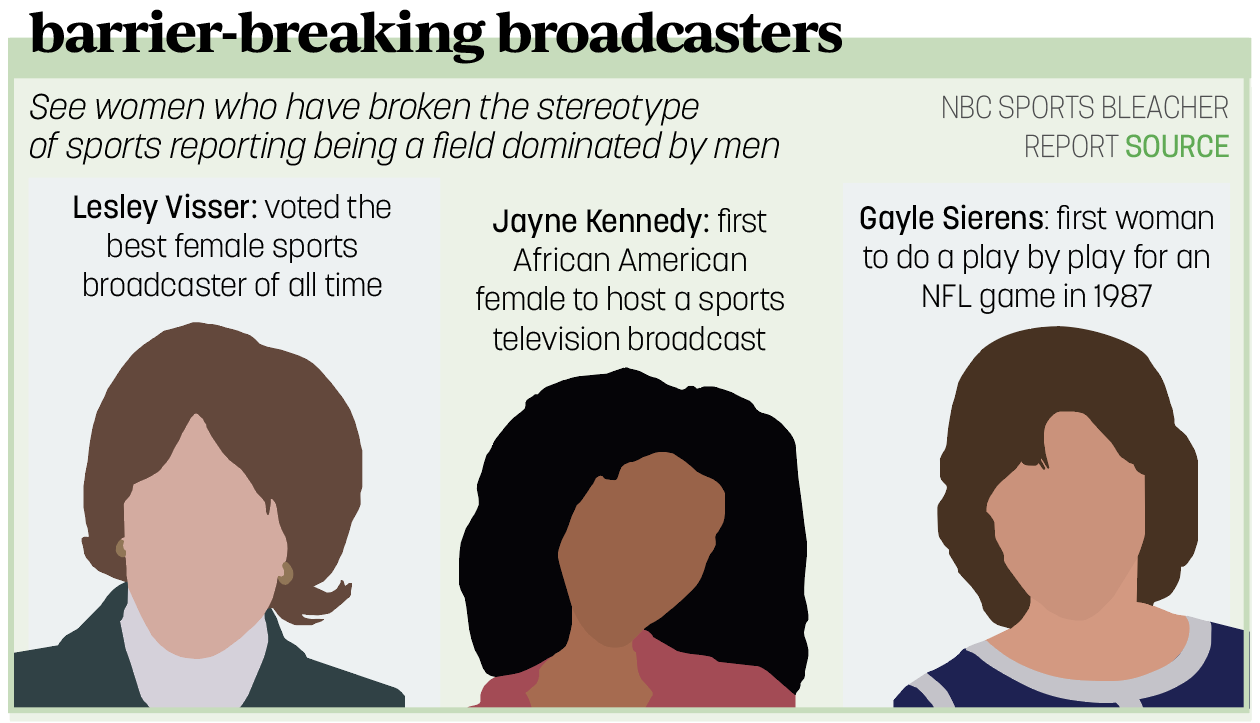Stanzy Williams, CHTV sports director and junior, is one of six sports reporters at this school. She’s the only female in the group.
“I know it’s not that popular (for females to join the sports team) and I know that there’s a lot of girls that are scared to get more into sports because of fear of judgement from men,” she said.
This is not a situation unique to CHS. The issue of gender stereotypes in sports media is not just prevalent in high schoolers. ESPN released a study last month that broke down the gender demographics of different communications occupations in the NBA. It found that 14.4% of sports reporters in the Associated Press were women, a number that has risen just 2.9% over the past three years.
The findings of the ESPN study are also representative in auditory sports reporting. WHJE advisor Dominic James, said of the 11 students in his sports radio department, only one of them is a female, and she only covers sports part of the time.

Maiza Munn, WHJE member and sophomore, is working to change that number. She said she aspires to continue sports radio all through high school and into her adult life. While not officially part of the sports team, Munn covers play-by-play sports commentary for WHJE and said working in a predominantly male group can be intimidating at times.
“As a girl, it’s like if you don’t know one player on the Green Bay Packers that benches half the season, you’re completely invalid,” she said.
Munn said her dream occupation for the future is to be an MLB sports commentator. However, she said there are still improvements that need to be made on the respect that female commentators receive.
“You would not believe the comments sections of all these social media posts [about females commentating on professional baseball games],” Munn said. “They’re like, ‘I didn’t want to hear a woman talk’ and ‘I will never watch baseball now’ and ‘I cant believe that feminists are taking over like this.’”
According to Williams, she is also looking to the future for a professional career in sports reporting. She said she has goals to become a sideline sports reporter.
“(Those reporters) go down on the field and make remarks about the game like how it went and then do an interview with the players right after they get off the field, do a little halftime report, stuff like that,” Williams said.
By the time she’s an adult of working age, Williams said she wants more girls to get involved in male-dominated sports media coverage.
“I really hope that guys start recognizing women more in sports in general and not overlooking their interests in that stuff,” she said.
James also said he thinks the ratio of boys to girls in sports reporting could use improvement, not just in the NBA but in sports in general.
“I think there’s a massive mismatch between the two obviously, and I think it has become more of an issue that people are aware of, but I’m not sure enough is being done to actually make things better,” he said.
However, starting steps are being made toward solving this problem. For example, MLB had its first all-female broadcasting team report on an Orioles-Rays game this past July.
Change is starting to happen for Williams as well. She said the disregard for females in sports media mainly stems from outside opinions, and that is not the case within the CHTV staff.
“The guys that I manage, they’re almost all my really close friends,” Williams said, “and it took awhile, but they now recognize me as someone who’s super into sports and [they] respect that.”

Contrarily, Munn said she isn’t quite to that point yet and she is still beginning to get content with her role as a female in sports commentary.
“I just hope I can get to a point where I’m decently respected and where I can do games comfortably, because I think I’m at a point where I’m really nervous because I don’t want to be judged,” she said. “I don’t want to be seen as weaker because I’m a girl, which sounds cliche but I don’t want to not get recognized.”


































![AI in films like "The Brutalist" is convenient, but shouldn’t take priority [opinion]](https://hilite.org/wp-content/uploads/2025/02/catherine-cover-1200x471.jpg)








































![Review: “The Immortal Soul Salvage Yard:” A criminally underrated poetry collection [MUSE]](https://hilite.org/wp-content/uploads/2025/03/71cju6TvqmL._AC_UF10001000_QL80_.jpg)
![Review: "Dog Man" is Unapologetically Chaotic [MUSE]](https://hilite.org/wp-content/uploads/2025/03/dogman-1200x700.jpg)
![Review: "Ne Zha 2": The WeChat family reunion I didn’t know I needed [MUSE]](https://hilite.org/wp-content/uploads/2025/03/unnamed-4.png)
![Review in Print: Maripaz Villar brings a delightfully unique style to the world of WEBTOON [MUSE]](https://hilite.org/wp-content/uploads/2023/12/maripazcover-1200x960.jpg)
![Review: “The Sword of Kaigen” is a masterpiece [MUSE]](https://hilite.org/wp-content/uploads/2023/11/Screenshot-2023-11-26-201051.png)
![Review: Gateron Oil Kings, great linear switches, okay price [MUSE]](https://hilite.org/wp-content/uploads/2023/11/Screenshot-2023-11-26-200553.png)
![Review: “A Haunting in Venice” is a significant improvement from other Agatha Christie adaptations [MUSE]](https://hilite.org/wp-content/uploads/2023/11/e7ee2938a6d422669771bce6d8088521.jpg)
![Review: A Thanksgiving story from elementary school, still just as interesting [MUSE]](https://hilite.org/wp-content/uploads/2023/11/Screenshot-2023-11-26-195514-987x1200.png)
![Review: "When I Fly Towards You", cute, uplifting youth drama [MUSE]](https://hilite.org/wp-content/uploads/2023/09/When-I-Fly-Towards-You-Chinese-drama.png)
![Postcards from Muse: Hawaii Travel Diary [MUSE]](https://hilite.org/wp-content/uploads/2023/09/My-project-1-1200x1200.jpg)
![Review: "Ladybug & Cat Noir: The Movie," departure from original show [MUSE]](https://hilite.org/wp-content/uploads/2023/09/Ladybug__Cat_Noir_-_The_Movie_poster.jpg)
![Review in Print: "Hidden Love" is the cute, uplifting drama everyone needs [MUSE]](https://hilite.org/wp-content/uploads/2023/09/hiddenlovecover-e1693597208225-1030x1200.png)
![Review in Print: "Heartstopper" is the heartwarming queer romance we all need [MUSE]](https://hilite.org/wp-content/uploads/2023/08/museheartstoppercover-1200x654.png)




